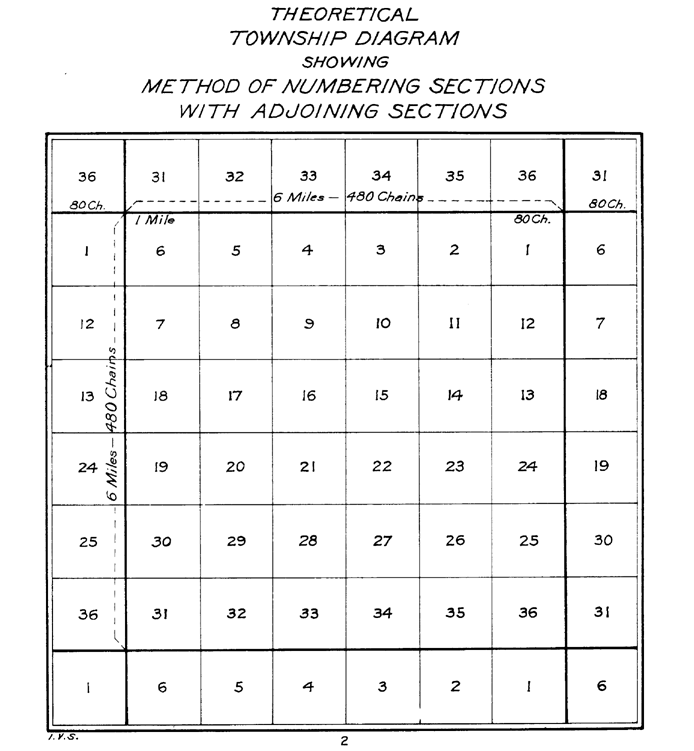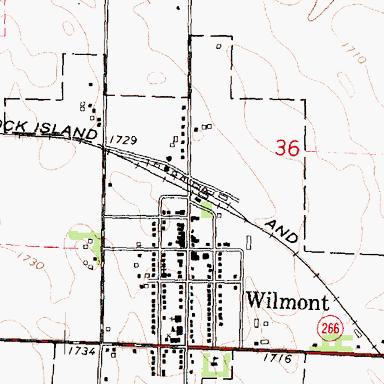|
Wilmont Township, Nobles County, Minnesota
Wilmont Township is a township in Nobles County, Minnesota, United States. The population was 228 at the 2000 census. Geography According to the United States Census Bureau, the township has a total area of 35.5 square miles (92.0 km²), all land. The main geographic feature of Wilmont Township is the Buffalo Ridge, a drainage divide separating the Mississippi River and Missouri River systems. Main highways include: * Minnesota State Highway 91 * Minnesota State Highway 266 (Nobles County 25) * Nobles County Road 13 * Nobles County Road 16 History Organization of Willmont Township (note the double-L) was approved by the Nobles County Board on November 12, 1878. There was a general disagreement over the township name, one faction wishing to call it Willumet, and the other favoring Lamont. On November 22, 1878, a compromise was reached, and the township was formally named Willmont. When the town of Wilmont was established in 1899, one L was dropped to ... [...More Info...] [...Related Items...] OR: [Wikipedia] [Google] [Baidu] |
Township (United States)
A township in some states of the United States is a small geographic area. The term is used in three ways. #A survey township is simply a geographic reference used to define property location for deeds and grants as surveyed and platted by the General Land Office (GLO). A survey township is nominally six by six miles square, or 23,040 acres. #A civil township is a unit of local government, generally a civil division of a County (United States), county. Counties are the primary divisional entities in many U.S. states, states, thus the powers and organization of townships varies from state to state. Civil townships are generally given a name, sometimes written with the included abbreviation "Twp". #A charter township, found only in the state of Michigan, is similar to a civil township. Provided certain conditions are met, a charter township is mostly exempt from annexation to contiguous cities or villages, and carries additional rights and responsibilities of home rule. Survey towns ... [...More Info...] [...Related Items...] OR: [Wikipedia] [Google] [Baidu] |
Buffalo Ridge
Buffalo Ridge is a large expanse of rolling hills in the southeastern part of the larger Coteau des Prairies. It stands 1,995 feet (608 m) above sea level. The Buffalo Ridge is long and runs through Lincoln, Pipestone, Murray, Nobles, and Rock counties in the southwest corner of Minnesota. Because of its altitude and high average wind speed, Buffalo Ridge has been transformed into a place for creating renewable energy. As of May 2022, over 1,000 wind turbines stand in the Buffalo Ridge area. Geology Buffalo Ridge is on a drainage divide separating the watersheds of the Mississippi and Missouri Rivers. Buffalo Ridge is part of the inner coteau and is the highest point of the Coteau des Prairies in Minnesota.DNR, ''Minnesota DNR'', http://www.dnr.state.mn.us/ecs/251Bc/index.html. Its bedrock is formed of Cretaceous shale, sandstone and clay that lie above the pinkish-red Upper Precambrian Sioux Quartzite.Anderson RR (1987) Precambrian Sioux Quartzite at ... [...More Info...] [...Related Items...] OR: [Wikipedia] [Google] [Baidu] |
Asian (U
{{disambiguation ...
Asian may refer to: * Items from or related to the continent of Asia: ** Asian people, people in or descending from Asia ** Asian culture, the culture of the people from Asia ** Asian cuisine, food based on the style of food of the people from Asia ** Asian (cat), a cat breed similar to the Burmese but in a range of different coat colors and patterns * Asii (also Asiani), a historic Central Asian ethnic group mentioned in Roman-era writings * Asian option, a type of option contract in finance * Asyan, a village in Iran See also * * * East Asia * South Asia * Southeast Asia * Asiatic (other) Asiatic refers to something related to Asia. Asiatic may also refer to: * Asiatic style, a term in ancient stylistic criticism associated with Greek writers of Asia Minor * In the context of Ancient Egypt, beyond the borders of Egypt and the cont ... [...More Info...] [...Related Items...] OR: [Wikipedia] [Google] [Baidu] |
White (U
White is the lightest color and is achromatic (having no hue). It is the color of objects such as snow, chalk, and milk, and is the opposite of black. White objects fully reflect and scatter all the visible wavelengths of light. White on television and computer screens is created by a mixture of red, blue, and green light. The color white can be given with white pigments, especially titanium dioxide. In ancient Egypt and ancient Rome, priestesses wore white as a symbol of purity, and Romans wore white togas as symbols of citizenship. In the Middle Ages and Renaissance a white unicorn symbolized chastity, and a white lamb sacrifice and purity. It was the royal color of the kings of France, and of the monarchist movement that opposed the Bolsheviks during the Russian Civil War (1917–1922). Greek and Roman temples were faced with white marble, and beginning in the 18th century, with the advent of neoclassical architecture, white became the most common color of new churches ... [...More Info...] [...Related Items...] OR: [Wikipedia] [Google] [Baidu] |
Population Density
Population density (in agriculture: standing stock or plant density) is a measurement of population per unit land area. It is mostly applied to humans, but sometimes to other living organisms too. It is a key geographical term.Matt RosenberPopulation Density Geography.about.com. March 2, 2011. Retrieved on December 10, 2011. In simple terms, population density refers to the number of people living in an area per square kilometre, or other unit of land area. Biological population densities Population density is population divided by total land area, sometimes including seas and oceans, as appropriate. Low densities may cause an extinction vortex and further reduce fertility. This is called the Allee effect after the scientist who identified it. Examples of the causes of reduced fertility in low population densities are * Increased problems with locating sexual mates * Increased inbreeding Human densities Population density is the number of people per unit of area, usuall ... [...More Info...] [...Related Items...] OR: [Wikipedia] [Google] [Baidu] |
Census
A census is the procedure of systematically acquiring, recording and calculating information about the members of a given population. This term is used mostly in connection with national population and housing censuses; other common censuses include censuses of agriculture, traditional culture, business, supplies, and traffic censuses. The United Nations (UN) defines the essential features of population and housing censuses as "individual enumeration, universality within a defined territory, simultaneity and defined periodicity", and recommends that population censuses be taken at least every ten years. UN recommendations also cover census topics to be collected, official definitions, classifications and other useful information to co-ordinate international practices. The UN's Food and Agriculture Organization (FAO), in turn, defines the census of agriculture as "a statistical operation for collecting, processing and disseminating data on the structure of agriculture, covering th ... [...More Info...] [...Related Items...] OR: [Wikipedia] [Google] [Baidu] |
Wilmont, Minnesota
Wilmont is a city in Nobles County, Minnesota, United States. The population was 339 at the 2010 census. Geography According to the United States Census Bureau, the city has a total area of , all land. By elevation, Wilmont is the highest incorporated community in Nobles County. Main highways include: * Minnesota State Highway 266 : (Discontinued in 2003—renamed Nobles County Road 25) * Nobles County Road 25 * Nobles County Road 16 * Nobles County Road 13 History The town of Wilmont was established in 1899. The town was named in a roundabout way after the township in which it was located. Willmont Township (note the double-L) was established in 1878. There was a general disagreement over the township name, one faction wishing to call it Willumet, and the other favoring Lamont. On November 22, 1878, a compromise was reached, and the township was formally named Willmont. For twenty-one years, the residents of Willmont Township lacked convenient railro ... [...More Info...] [...Related Items...] OR: [Wikipedia] [Google] [Baidu] |
County 16
A county is a geographic region of a country used for administrative or other purposesChambers Dictionary, L. Brookes (ed.), 2005, Chambers Harrap Publishers Ltd, Edinburgh in certain modern nations. The term is derived from the Old French denoting a jurisdiction under the sovereignty of a count (earl) or a viscount.The Oxford Dictionary of English Etymology, C. W. Onions (Ed.), 1966, Oxford University Press Literal equivalents in other languages, derived from the equivalent of "count", are now seldom used officially, including , , , , , , , and ''zhupa'' in Slavic languages; terms equivalent to commune/community are now often instead used. When the Normans conquered England, they brought the term with them. The Saxons had already established the districts that became the historic counties of England, calling them shires;Vision of Britai– Type details for ancient county. Retrieved 31 March 2012 many county names derive from the name of the county town (county seat) with th ... [...More Info...] [...Related Items...] OR: [Wikipedia] [Google] [Baidu] |




